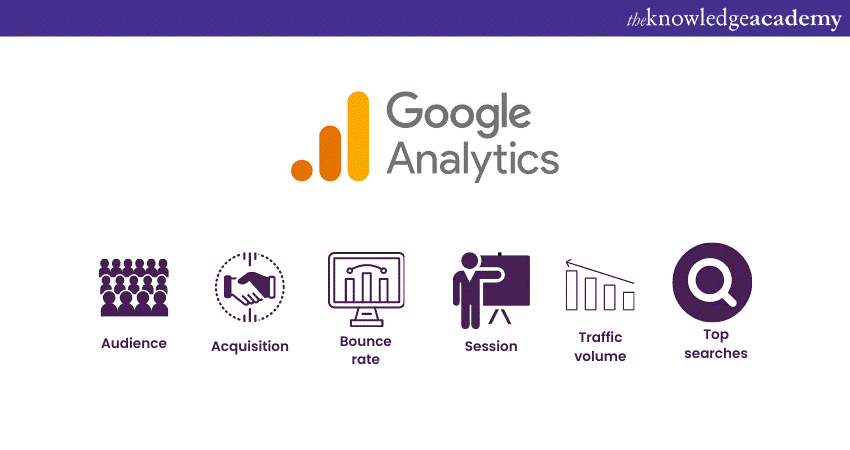We may not have the course you’re looking for. If you enquire or give us a call on +43 720 115337 and speak to our training experts, we may still be able to help with your training requirements.
Training Outcomes Within Your Budget!
We ensure quality, budget-alignment, and timely delivery by our expert instructors.

Google Analytics, a part of the Google Marketing Platform, is a tool websites use to track and monitor their performance on the internet. It provides real-time information and analysis that helps website owners keep a watch on the visitors and the actions or activities they perform on the site. Such information helps in determining ways to enhance the performance of the website.
According to W3Techs, approximately 48.7 per cent of websites use Google Analytics to monitor and analyse their performance. Read this blog to learn about Google Analytics, how it works, its metrics, and its benefits and limitations.
Table of Contents
1) What is Google Analytics?
2) How Does Google Analytics Work?
3) What is Google Analytics Used for?
4) What are Google Analytics Metrics?
5) What is a Dimension in Google Analytics?
6) Pros and Cons of Google Analytics
7) Conclusion
What is Google Analytics?
Google Analytics constitutes a web analytics service that provides Search Engine Optimisation (SEO) solutions. It helps analyse a website's performance and provides information about its visitors. Apart from identifying the most popular sources of user activity, Google Analytics also offers in-depth information about the effectiveness of a company's digital marketing initiatives. It provides a host of useful information to website owners, such as:
a) Number of clicks a website gets;
b) Latest trends and patterns in user activity;
c) Demographic data of the users
How Does Google Analytics Work?
To use Google Analytics, users must first create an Analytics account. This is different from a Google (Gmail) account. Having a Gmail account does not automatically provide access to Google Analytics. A separate, one-time registration process is required.
Setting Up Google Analytics
1) Create an Analytics Account: Sign up for a Google Analytics account if you don't already have one.
2) Add Tracking Code: Insert a small piece of JavaScript measurement code into each page of your website. This code will collect pseudonymous information such as:
a) How a site visitor interacted with the page.
b) Which browser the visitor used.
c) The browser's language setting.
d) The device and operating system the browser is running on.
e) The traffic source (e.g., search engine, online ad, email marketing campaign) that brought the user to the site.
Important Considerations
1) Tracking Code Requirement: Google Analytics will not collect data for any page lacking the tracking code.
2) Data Aggregation and Storage: All collected data is aggregated, stored in a database, and processed to create reports. These reports help users understand their customers and marketing results.
3) Data Exclusions: Once processed data is stored in the database, it cannot be modified. Be careful when excluding data, as filters added to exclude data from analysis in Google Analytics are permanent.
Data Collection
Google Analytics acquires user data from each website visitor through page tags. A JavaScript page tag, inserted into the code of each page, helps generate data such as:
1) Number of users
2) Bounce rates
3) Average session duration
4) Sessions by channel
5) Pageviews
6) Goal completions
The page tag functions as a web bug or web beacon to gather visitor information. Since it relies on cookies, the system cannot collect data for users who have disabled cookies.
What is Google Analytics Used for?
Google Analytics is a powerful tool for tracking comprehensive data about your website and its visitors. It provides insights into:
1) How users find your website?
2) Their interactions with your content
3) Audience demographics and behaviours
4) Conversion rates and purchase patterns
With this information, you can leverage Google Analytics reports to:
1) Assess the success of your marketing campaigns
2) Analyse page performance and optimise for better results
3) Identify and target the right audience for your content and marketing
4) Monitor conversions and track purchase behaviours
Google Analytics empowers businesses to make data-driven decisions and improve overall website effectiveness.
What are Google Analytics Metrics?
Metrics play a vital role in the working of Google Analytics. They are quantitative analyses of a particular type of data. Some common examples of metrics are - average session lengths, website visits, web pages per session, and the average amount of time spent on the website, etc.
These metrics are units of measurement that measure website traffic across several dimensions. These quantitative measurement metrics are universally accepted. It allows customers to monitor up to 200 metrics. Some of the most used Metrics in Google Analytics are as follows:
a) Users or Audience: This metric helps identify and understand your users. A user is a unique or first-time visitor to a website. It also includes information such as demographics, location, retention, and device technology. These metrics enable you to segment users based on different criteria.
b) Bounce Rate: This is the percentage of users who visit only one webpage of a website. Found in the 'Overview' section under 'Audience', a high bounce rate can indicate technical issues, content that doesn't meet user needs, or a lack of internal links or Calls-to-Action (CTAs). High bounce rates suggest poor user targeting in digital marketing campaigns. Segmenting site visitors can help identify the underlying issues.
c) Sessions: This metric represents the collection of visitor interactions within a 30-minute activity window. While user metrics show the number of unique visitors over a period, sessions indicate how often users engage with the site. For example, if a site has 10 users and 20 sessions, it means each user visited the site twice on average during the specified period.Register in our Digital Marketing Courses today! Learn key strategies, SEO, social media, and Google Analytics to boost your career and drive online success.
d) Average Pages Per Session: Average pages per session, as it denotes, is the number of pages a user views in a single session while on the website. This is found in the 'Overview' section under 'Audience'. The number of pages a user interacts with provides a good proxy for user engagement. It is suggested to have a combined analysis of two metrics -average pages per session and average session duration.
e) Organic and Paid Traffic: There are two types of search traffic - organic and paid. Organic search traffic comes from non-paid Search Engine Results Pages (SERPs) and indicates the effectiveness of the website's optimisation.
Paid search traffic comes from users who click on paid advertisements on SERPs, reflecting the effectiveness of ad campaigns. This feature can also compare the performance of organic and paid content. f) Top Queries in Search: This metric, found in the 'Behaviour' section, tracks site search data, helping to understand user queries and expectations. It indicates the type of content users are looking for on your website.
f) Google Analytics Metrics: Audience, Acquisition, Bounce rate, Session, Traffic volume, Top searches.

What is a Dimension in Google Analytics?
Dimensions are descriptive or categorical attributes used to classify and organise data in meaningful ways. For example, the dimension "Region" might be utilised to evaluate the average session duration across various geographical areas. Metrics like "average session duration" provide numerical values to complement these classifications.
In Google Analytics, dimensions can be rearranged to suit analysis needs. Common examples of dimensions include:
1) Language
2) Browser type
3) City and country
4) Device models
5) User age group
These dimensions help provide detailed insights into user behaviour and characteristics, enabling more effective data analysis and decision-making.
Pros and Cons of Google Analytics
Google Analytics is the leading platform used by websites to monitor and review their performance. While it is the most widely used platform, it comes with its set of pros and cons. Let's look at some of its advantages and disadvantages:
Advantages of Google Analytics
The following are the key benefits of Google Analytics:
a) Google Analytics offers a flexible and effective platform for data analysis
b) It is simple to use
c) Metrics and dimensions can be customised in Google Analytics
d) It furnishes an extensive array of valuable information
e) Google Analytics also provides features like data visualisation, monitoring, reporting, predictive analysis, etc.
Disadvantages of Google Analytics
The following are the disadvantages of using Google Analytics:
a) The first drawback of Google Analytics is related to data accuracy. In Google Analytics, a user may lower the overall accuracy and precision of data by a significant margin if they block its cookies, some browser plugins, ad filtering tools, or private networks.
b) In Google Analytics, samples of thousands of random sessions are used to lower the server load. It means it shows the total number of visitors only as an error margin in the results. As a result, significant error margins might exist even for a short amount of data.
c) Google Analytics does not work properly for large websites with strict access control and permission systems. It does not provide much control over multiuser access, making it difficult to share the dashboards with many analysts.
Conclusion
We hope you read and understood this blog on what Google Analytics is and how it helps websites optimise to rank higher on search engines such as Google. It allows website owners to see how their visitors interact with their websites over time. Interpreting this data, they can modify their websites, resulting in better performance. The gathering, analysis, tracking, and visualisation of data and interaction with other applications are all possible in Google Analytics.
Achieve Google Analytics Certification! Master analytics, track website performance, and enhance your skills to advance your career with this valuable certification.
Frequently Asked Questions

Google Analytics enhances website performance by tracking user behaviour, identifying high-performing pages, and pinpointing areas for improvement. It provides insights into traffic sources, audience demographics, and conversion rates, enabling businesses to optimise marketing strategies, content, and user experience effectively.

To set up Google Analytics, create an account on the platform, and generate a unique tracking ID. Add this tracking code to your website's header or use a tag manager. Customise settings for goals, filters, and reports to align with your objectives. Begin tracking and analysing your site's performance in real time.

The Knowledge Academy takes global learning to new heights, offering over 30,000 online courses across 490+ locations in 220 countries. This expansive reach ensures accessibility and convenience for learners worldwide.
Alongside our diverse Online Course Catalogue, encompassing 19 major categories, we go the extra mile by providing a plethora of free educational Online Resources like News updates, Blogs, videos, webinars, and interview questions. Tailoring learning experiences further, professionals can maximise value with customisable Course Bundles of TKA.

The Knowledge Academy’s Knowledge Pass, a prepaid voucher, adds another layer of flexibility, allowing course bookings over a 12-month period. Join us on a journey where education knows no bounds.

The Knowledge Academy offers various Digital Marketing Courses, including Pinterest Marketing Course, Google Analytics Certification and Social Media Marketing Course. These courses cater to different skill levels, providing comprehensive insights into Pinterest Alternatives.
Our Digital Marketing Blogs cover a range of topics related to Google Analytics, offering valuable resources, best practices, and industry insights. Whether you are a beginner or looking to advance your Digital Marketing skills, The Knowledge Academy's diverse courses and informative blogs have got you covered.
Upcoming Digital Marketing Resources Batches & Dates
Date
 Digital Marketing Course
Digital Marketing Course
Fri 24th Jan 2025
Fri 28th Mar 2025
Fri 23rd May 2025
Fri 25th Jul 2025
Fri 26th Sep 2025
Fri 28th Nov 2025







 Top Rated Course
Top Rated Course



 If you wish to make any changes to your course, please
If you wish to make any changes to your course, please


